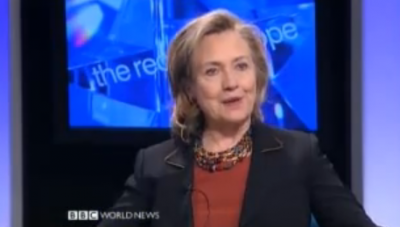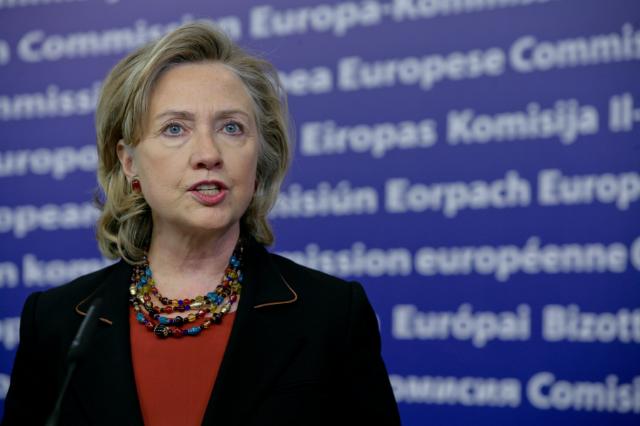Europe's power of influence, explained "for dummies", by Hillary Clinton
 It was Hillary Clinton who came in person to say all the good things she thinks of the European Union's foreign policy, and of its High Representative, Cathy Ashton. It was on the BBC Parliamentary Channel's Record Europe program. And the two women were reunited on the set, questioned by our colleague Shirin Wheeler.
It was Hillary Clinton who came in person to say all the good things she thinks of the European Union's foreign policy, and of its High Representative, Cathy Ashton. It was on the BBC Parliamentary Channel's Record Europe program. And the two women were reunited on the set, questioned by our colleague Shirin Wheeler.
« Yes now I have someone on the phone to tell me: "What's Europe thinking today"" explains the US Secretary of State who paints a glowing portrait of her European counterpart. " I found someone who took this job with extraordinary energy and I know it is a huge job she has undertaken for the European Union ". The fact of being "two women" has played, she believes, with this relationship as much political as personal. " We have both been involved for a long time in the politics of our respective countries. (...) And it is also, for me, a real pleasure to be able not only to talk about serious things, but also about our children, the purchases that we can make... ».
A division of labor between the EU and the United States
Then responding to certain criticisms which were expressed in particular on the absence of Cathy Ashton at the opening of negotiations on the Middle East (1), Hillary Clinton made a point of highlighting the need to establish priorities between the EU and USA. " I think we can say, 24 hours a day would not be enough to meet all the expectations, all the obligations, the requests that each of us may receive. So we have to set priorities. "" the European Union and the United States must present themselves as so many different places. And so I think what Cathy and I are trying to do is pioneer work, something like a cooperative approach and even a division of labor. »
Influencing work
Based on the question of the Middle East, Hillary Clinton thus illustrates this division of labor between the EU and the USA. It begins immediately by denying the impression of European weakness and sheds light on another angle. " I think it is a misperception to believe that the EU is not in a position to exert influence” explains the US Secretary of State. "There is so much work to do in all these complex foreign policy challenges - strengthening the Palestinian Authority, the EU's relationship with the Arab world, advocating for a two-state solution is in the best interest of the Palestinian people is a big part of the negotiating context. The United States, in our efforts to bring the parties together, plays a different role. »
“...I think zero-sum analysis of foreign policy is really outdated. We no longer have those linear questions where it used to be easy to decide. (...) During the cold war, it was very clear which side we were on and how we worked together (...). We live in a much more complicated environment now. It's not that our problems are worse. (...) But they are different. And they require a different use of hard power than soft power. When I became Secretary of State I said the United States was going to start using Smart power, which is a combination of those tools and to move away from that kind of analysis and reaction at all or Nothing. In this partnership between the EU and the United States, I think it will take some time to adjust and in the member states we all still have our role to play individually, of course. But this kind of cooperation is the only answer to the complexity we face in the 21st century. »
To listen to part of the exchange: BBC The Record Europe
Read also:


Comments closed.